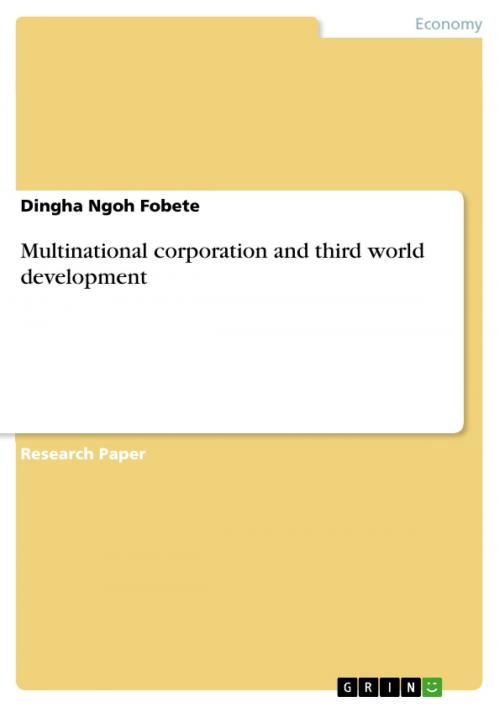| Author: | Dingha Ngoh Fobete | ISBN: | 9783640175321 |
| Publisher: | GRIN Publishing | Publication: | September 24, 2008 |
| Imprint: | GRIN Publishing | Language: | English |
| Author: | Dingha Ngoh Fobete |
| ISBN: | 9783640175321 |
| Publisher: | GRIN Publishing |
| Publication: | September 24, 2008 |
| Imprint: | GRIN Publishing |
| Language: | English |
Research Paper (postgraduate) from the year 2005 in the subject Economics - International Economic Relations, grade: 2, University of Kassel, 22 entries in the bibliography, language: English, abstract: Multinational Corporations (MNC) are important transitional agents in the contemporary global political economy. Although they can be viewed as economic actors following the logic of international market, their activities inevitably arouse questions of national power. Not surprisingly, such questions are most pronounced in the study of developing countries where weak government and societies potentially give the MNC strong bargaining position. Thus, the nature of their relationship between developing countries and the implication of this relationship for economic growth remains highly controversial. How ever, proponents of MNC posit in the past that MNC have made important contribution to developing countries. This interaction between MNCs and third world economy has led to a profound relationship whose impacts are enormous. Although many scholars have written more on the impact of MNC on host less developed countries, the most important question is, Do foreign firms behave differently from locally owned firms and if so what are their implication? Multinational corporations are one of the main conduits through which investment is channelled and their evolution has reflected broader developments (OECD 2003). This impact however will be examined from the negative and positive impact gearing towards the development of third world. However it is imperative to examine the characteristics of developing countries as well as some objectives of Multinational Corporations (MNC).
Research Paper (postgraduate) from the year 2005 in the subject Economics - International Economic Relations, grade: 2, University of Kassel, 22 entries in the bibliography, language: English, abstract: Multinational Corporations (MNC) are important transitional agents in the contemporary global political economy. Although they can be viewed as economic actors following the logic of international market, their activities inevitably arouse questions of national power. Not surprisingly, such questions are most pronounced in the study of developing countries where weak government and societies potentially give the MNC strong bargaining position. Thus, the nature of their relationship between developing countries and the implication of this relationship for economic growth remains highly controversial. How ever, proponents of MNC posit in the past that MNC have made important contribution to developing countries. This interaction between MNCs and third world economy has led to a profound relationship whose impacts are enormous. Although many scholars have written more on the impact of MNC on host less developed countries, the most important question is, Do foreign firms behave differently from locally owned firms and if so what are their implication? Multinational corporations are one of the main conduits through which investment is channelled and their evolution has reflected broader developments (OECD 2003). This impact however will be examined from the negative and positive impact gearing towards the development of third world. However it is imperative to examine the characteristics of developing countries as well as some objectives of Multinational Corporations (MNC).















